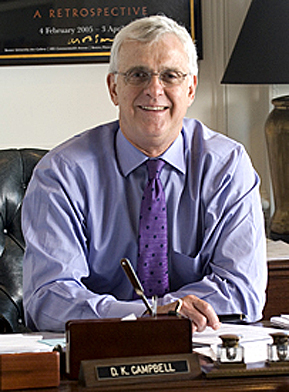David Campbell to Step Down as Provost
Returns to research, University will launch search

University Provost David Campbell will step down to return to teaching and to focus on the research projects he set aside more than five years ago when he assumed the position of chief academic officer. Campbell, a well-known scholar and theoretical physicist, who specializes in nonlinear phenomena and condensed matter physics, received the American Physicalnon Society’s 2010 Julius Edgar Lilienfeld Prize, awarded for “pioneering new approaches to the study of complex systems and for communicating the excitement of this new field to diverse audiences.” He will continue as University provost while an international search is conducted for his successor.
“Over the past year, I have had many conversations — with President Brown, my family, and others — about my own long-term goals and plans,” Campbell wrote in an e-mail sent to faculty last night. “After much careful thought and deliberation, I have concluded that I cannot in good faith make the long-term commitment that Boston University needs from those going forward in senior leadership roles.
“These last five years have been fast-paced and exhilarating,” he wrote. “Together we have accomplished much. In the last year alone, we have seen the implementation of key recommendations of the report of the Council on Faculty Diversity and Inclusion, the issuance of the task force report “One BU: Unlocking the Undergraduate Educational Experience,” the completion of the report of the task force on non-tenure-track faculty, and most recently, the successful launch of the University Honors College. We are well placed to follow through on these and other important initiatives that will forge the future of Boston University.”
Brown, writing in the same message, thanked Campbell for his tireless efforts “to make Boston University a better institution and for doing so with unfailing good humor and generosity of spirit.
“The commitment and sacrifices a faculty member makes to an institution to serve in a leadership role is larger than many of us can imagine,” said Brown. “This is especially true of the role of the University provost, which is, without a doubt, our most demanding academic leadership position.”
Brown pointed to the progress the University has made in many areas under Campbell’s leadership, including strides in achieving gender equity in faculty salaries and in making salaries more competitive with their peers’. “David fostered the increasing quality of the University in everything he did as provost,” he said, “whether in working with our deans to hire or retain faculty or finding the resources to support innovation in education and research.”
Executive Vice President Joseph Mercurio described Campbell as “an individual of the highest order of moral and ethical standards.
“David has been a calm and objective voice of reason and an effective leader who has a rare and extremely broad understanding of the varied programs of the University,” Mercurio said. “While he has accomplished a great deal over the last five years by any standard, his most important contribution may very well have been during his interim appointment, when he was largely responsible for providing stability and constructive leadership during a period of great uncertainty for Boston University.”
Brown said the University will hire an experienced search consultant and will work collaboratively to solicit input and advice and to review candidates. “It is my goal to find a distinguished scholar and researcher with extensive senior leadership experience,” he said, “so that we will have a seamless transition and continue to move the University forward.”
The provost is Boston University’s chief academic officer, responsible for guiding the educational and budget policies for all of the Charles River Campus schools and colleges, comprising more than 27,000 students and nearly 2,300 faculty. The provost also oversees many research centers, institutes, administrative offices, and social programs.
Before his appointment as provost in September 2005, Campbell served as provost ad interim for a year and as dean of the College of Engineering for four years. He led the college through a period of rapid and dynamic growth, including the receipt in 2001 of a Whitaker Foundation Leadership Award that provided $14 million for biomedical engineering.
Campbell came to BU as ENG dean in fall 2000, after eight years as a professor and head of the department of physics at the University of Illinois, Urbana-Champaign (UIUC). Previously, he was director of the Center for Nonlinear Studies at Los Alamos National Laboratory, which he had joined in 1974 as the first J. Robert Oppenheimer Fellow. He earned a B.A. in chemistry and physics from Harvard University and a Ph.D. in theoretical physics and applied mathematics from Cambridge University. After graduating, he held postdoctoral positions at UIUC and at the Institute for Advanced Study in Princeton, N.J.
Art Jahnke can be reached at jahnke@bu.edu.

Comments & Discussion
Boston University moderates comments to facilitate an informed, substantive, civil conversation. Abusive, profane, self-promotional, misleading, incoherent or off-topic comments will be rejected. Moderators are staffed during regular business hours (EST) and can only accept comments written in English. Statistics or facts must include a citation or a link to the citation.